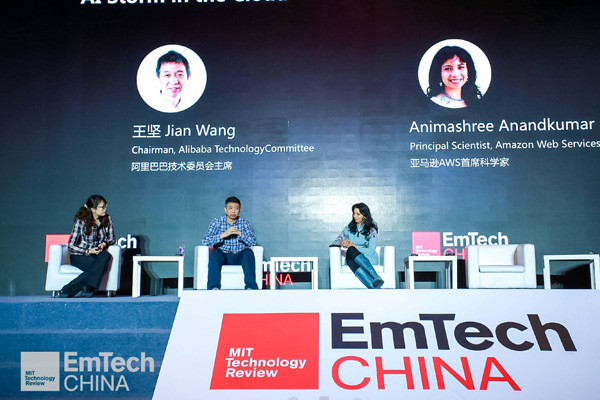Artificial intelligence to boost real economy

At the EmTech CHINA forum held in Beijing from Jan. 28 to 30, Wang Jian, Chairman of the Alibaba Technology Committee, described how the “City Brain,” a smart system that can regulate the traffic flow in the city, has improved traffic efficiency in Hangzhou since the system was put into use in 2016. ( EMTECH CHINA)
In December 2017, China’s Ministry of Industry and Information Technology issued a strategy for the artificial intelligence sector that predicted AI will have a significant spillover effect and will further promote other technologies and breakthroughs in emerging strategic industries.
Rui Mingjie, a professor from the School of Management at Fudan University, said AI will have three major impacts on the real economy: First, changes in production tools. Embedded in production equipment, AI can lead to smart equipment that can be tailored to the needs of each consumer, in contrast to existing production equipment, which cannot. Second, AI maximizes consumer satisfaction. Third, AI may replace part of the labor force, affecting related industries and employment, as well as the development of society as a whole.
Liu Yuan, a professor from the School of Management at Zhejiang University, said AI is universal. It can change methods of manufacturing, deal with the relationships between production, production demand and supply chains through optimal allocation of resources. He also said that it can boost innovation in product, manufacturing technology and industrial models. At the same time, it can also promote flexible, environmental friendly, intelligent manufacturing, which is crucial to upgrading the real economy.
Some scholars said that the development of AI requires success in not only theoretical research, but also in commercial and industrial applications. The deep integration of AI and the real economy requires application—the key to the success of artificial intelligence projects. Automation of AI can greatly increase productivity. It can work more efficiently and accurately at lower costs in industries such as manufacturing, agriculture, service industry and finance. In traditional industries, AI can also create new products and services, and provide new types of jobs and businesses.
Li Yongjian, a research fellow from the National Academy of Economics Strategy at the Chinese Academy of Social Sciences, said it is necessary to focus on the in-depth integration of AI and agriculture and manufacturing industries. In agriculture, AI technology can better forecast demand for agricultural products, enhance overall agricultural production efficiency, ensure the quality and safety of agricultural products and establish an intelligent agricultural production service system. For the manufacturing industry, AI can help better understand customer needs, and thus achieve large-scale customized production. It can also substantially improve research and development efficiency, create tailored production processes to improve the flexibility of the production line and speed up the flow of products.
Li pointed out that the current AI technology is still not widely applied in the fields of agriculture and industrial production. The data available for analysis is still limited. There is still limited application of artificial intelligence in small and medium-sized enterprises. The new business model brought by the integration of AI and the real economy still requires specific supporting policies.
Liu argues that it is essential to coordinate the supply side and the demand side, and further integrate the two sides by boosting demand. A focus on the smart transformation of enterprises and the integration of the upstream and downstream of the industrial chain may release greater social and economic benefits.
Li put forward the following six measures to further integrate AI technology into industries: first, step up publicity so that enterprises have the knowledge and motivation to apply artificial intelligence technology to their industry; second, establish an integrated promotion mechanism at the national level to govern the in-depth integration of AI and the real economy; third, focus on the security problems caused by AI and promote the in-depth application of AI in the field of network security; fourth, encourage innovation in all kinds of business models; fifth, establish an implementable and operational policy system; sixth, build a big-data center to achieve data sharing and accelerate the research, development and utilization of data to make data “fuel” and “boost” the rapid development of AI.
(edited by SUI JINGJING)

 PRINT
PRINT CLOSE
CLOSE